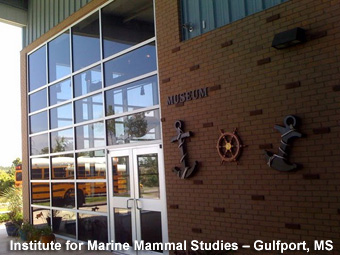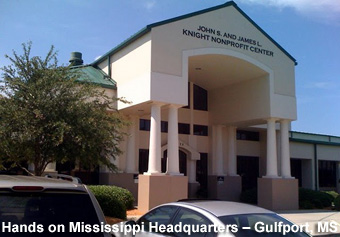Part 3: Last Try
May 17, 2010
 I wanted to explore a possible volunteer opportunity at the Institute for Marine Mammal Studies (IMMS) in Gulfport, MS. I was greeted at the door by Mimi Nanney, who explained that they were hosting a bunch of students there this morning and things might be a little hectic.
I wanted to explore a possible volunteer opportunity at the Institute for Marine Mammal Studies (IMMS) in Gulfport, MS. I was greeted at the door by Mimi Nanney, who explained that they were hosting a bunch of students there this morning and things might be a little hectic.
Mimi told me all the same things about restrictions imposed by BP and the Institute’s ongoing efforts to mobilize volunteers online at www.imms.org. She told me their experts were standing by in case of any stranding incidents that may occur. They are always on call for when fishermen report hooked turtles, and they often treat them quickly on site and release them. If a turtle requires rehab, they are transported back to the Institute for treatment. Mimi wanted me to know that most local fishermen are diligent about calling IMMS when they discover hooked turtles, and her group is always prepared to assist whenever it happens.
Mimi also told me that several of their employees are ex-dolphin trainers from Marine Life, and many are the same people who rescued the Marine Life dolphins when they were washed out into the Gulf by Katrina.
IMMS is charged with surveying the coasts on Hancock, Harrison, and Jackson Counties, as well as the Mississippi Gulf Coast Barrier Islands, and if you ever do come across a stranded animal on shore, please call 1.888.SOS.DOLPHIN. Once again, she stressed that the general public should NEVER attempt to rescue a stranded animal. There is a reason it beached itself in the first place, and it might need medical attention.

After the next set of students began to trickle in, I thanked Mimi for her time and headed up the road to see the folks over at Hands on Mississippi. Lauri Cochran told me that most of the volunteer opportunities at HoM do not concern the current oil crisis in the Gulf, and that Hands on Mississippi is still very involved in Katrina relief, alleviating homelessness on the Gulf Coast, and several other community building programs. One thing is certain: there is a great deal of work that still needs to be done, no matter which problem you choose to focus on.
This would be the last day of my visit to the Gulf Coast. Tomorrow I was heading home to Atlanta.
Page: 1 2
